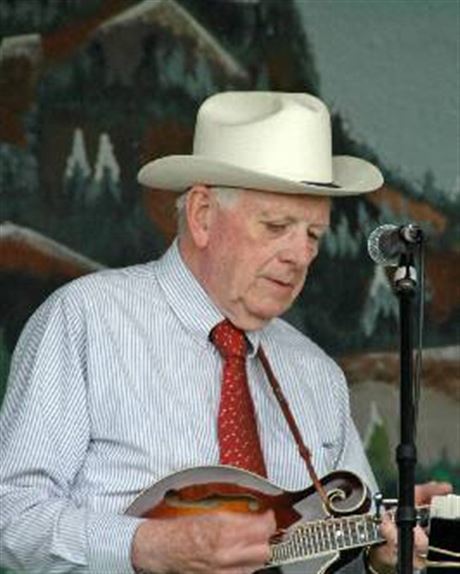You didn’t have to come from the heart of Appalachia to become a bluegrass legend, and you didn’t have to travel to Dixie to play in a band called The Dixie Travelers.
William Colleran, better known as Mac Martin, demonstrated that in his 60-plus years as a musician in the heart of Pittsburgh.
Mr. Colleran, a member of the Bluegrass Hall of Fame, died Monday, according to his daughter Jeanne. He was 96.
He grew up in Oakland listening to Irish jigs and reels, along with the Carter Family and other hillbilly music on WWVA. He was paying close attention when Bill Monroe, the father of bluegrass, formed the Blue Grass Boys in 1939. Martin got his first guitar a year later, when he was 15, and when the instructor didn't know bluegrass, he decided to learn from the records.
With the contributions of players like Lester Flatt and Earl Scruggs, bluegrass was blooming while Martin was serving in the U.S. Navy and stationed on the island of Okinawa. At Christmastime 1945, he took note when the three-finger roll on the banjo was introduced at the Grand Ole Opry.
After his discharge, the singer, guitarist and mandolin player formed his first group, the Pike County Boys, with two other Bills — fiddler Bill Higgins and bassist Bill Wagner — and playing regularly on WHJB in Greensburg. Around that time, he started using the stage name Mac Martin.
In 1954, with Mike Carson and Billy Bryant, Martin formed the Dixie Travelers, making their home at Walsh's Lounge in East Liberty for the next two decades.
In spite of the name, they only went as far as New Jersey and upstate New York.
"It was the right thing to do," Martin told the Post-Gazette in 2005. "I had the kids, and my parents were getting up in age, and I needed to be around. That's why I stayed here.”
Martin, living in Brookline with his wife, Jean, and their five kids, worked a day job keeping the books at A&P grocery stores. When the chain left Pittsburgh in 1969, he took a job as controller at Volkwein Music on the North Side.
“Those days were lean — really lean — for early country bands,” he explained. “Music was the only thing a lot of those musicians knew how to do. They didn't have a profession or a trade; they either worked in the mills or the mines, or, if they could, they went out on the road.
“The road is a hard life — hard on the guys, harder on their families — but for some of them, it was a better option.”
Despite being tethered to Pittsburgh, The Dixie Travelers were well known in the bluegrass world, attracting the likes of The Kingston Trio, Ralph Stanley, David Grisman and the Country Gentlemen to join them at Walsh’s and Gustine’s in Oakland.
Over the course of their six-decade-plus career, the Dixie Travelers recorded 14 albums for such labels as Gateway Records and Rural Rhythm Records.
The love of music ran through his family, with his youngest son, Robert, also an accountant, becoming a member of the Dixie Travelers.
“All of us played and sang and just, you know, have a tremendous love and the deep knowledge of American music and bluegrass music,” said his daughter Jeanne, retired provost and professor emeritus at John Carroll University. “He probably knew the words to over a thousand songs, and so his albums reflected this sort of deep knowledge. I have an academic background and I used to tease him and say, ‘You're really like an ethnomusicologist,’ and he was like ‘What the heck is that?’
“He played the music as it was being formulated,” she added, “and so living to [almost] 97, he's one of the very few remaining, until he passed away this week, who lived the music from the time it was formulated.”
In 2001, Martin shared with the Post-Gazette his formula for success: “Surround yourself with good musicians. Keep a reasonably small repertoire of tunes. Do ‘show’ tunes that get the crowd’s attention and pull off a few surprises.”
It suited him.
Martin retired from the 9-to-5 world in 1995 but continued to perform live for another two decades, retiring in 2015 with a show at Pittsburgh Center for the Arts.
He once joked about his tireless week-in-and-week-out consistency.
“You want to do it and you don’t want to do it,” Mr. Colleran told the Post-Gazette. “It’s like bowling: You join a league, and you’re supposed to go every week.”
Scott Mervis: smervis@post-gazette.com.
First Published: March 1, 2022, 4:24 p.m.


















